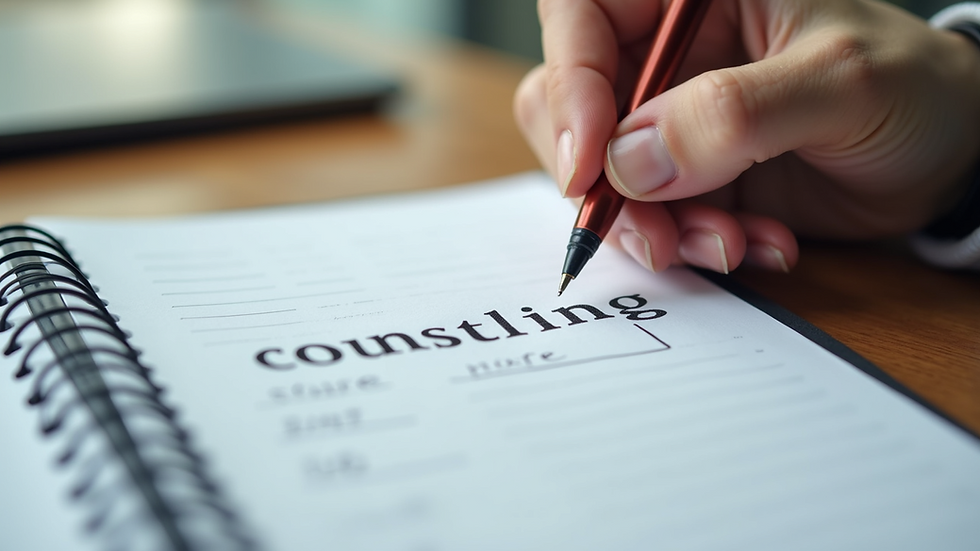How Affair Recovery Counseling Heals Relationships
- liyebote
- Aug 17
- 3 min read
When trust shatters, the path forward can feel like walking through a fog. Infidelity is a storm that shakes the very foundation of a relationship. Yet, within that storm lies the possibility of renewal, growth, and deeper connection. I want to share how infidelity recovery counseling can be the lighthouse guiding you back to safe shores. It’s not just about mending what’s broken but about rediscovering the strength and love that brought you together in the first place.
Understanding Infidelity Recovery Counseling
Infidelity recovery counseling is a specialized form of therapy designed to help couples navigate the complex emotions and challenges that arise after an affair. It’s a space where honesty meets healing, and where both partners can express their pain, confusion, and hopes without judgment.
This counseling focuses on:
Rebuilding trust: Trust is fragile after betrayal. Counselors help couples develop transparency and accountability.
Improving communication: Often, infidelity exposes communication gaps. Therapy teaches new ways to listen and speak.
Exploring underlying issues: Sometimes, affairs are symptoms of deeper problems. Counseling uncovers these layers.
Setting boundaries and expectations: Couples learn to define what fidelity means to them moving forward.
The process is gentle yet purposeful. It’s about creating a safe container where both partners feel heard and valued. The counselor acts as a guide, helping you navigate the emotional terrain with empathy and expertise.

The Role of Infidelity Recovery Counseling in Healing
Healing after infidelity is not linear. It’s a journey with ups and downs, moments of clarity, and times of doubt. Infidelity recovery counseling provides a roadmap through this terrain. It helps you:
Process emotions: Anger, sadness, guilt, and shame can feel overwhelming. Counseling offers tools to manage these feelings constructively.
Understand motivations: Why did the affair happen? What unmet needs or vulnerabilities were involved? Understanding is key to forgiveness.
Rebuild intimacy: Emotional and physical intimacy often suffer after betrayal. Therapy supports rekindling connection.
Create a new narrative: Couples learn to rewrite their story, not erasing the past but integrating it into a stronger future.
For example, one couple I worked with found that their counseling sessions became a sacred space to share fears and dreams they had never voiced before. This openness laid the groundwork for renewed commitment.
If you’re searching for affair recovery counseling near me, know that specialized support is available to help you through this difficult time.

How to Recover from Having an Affair?
Recovery begins with taking responsibility and facing the truth. If you are the partner who had the affair, the path to healing involves:
Acknowledging the impact: Recognize the pain caused and avoid minimizing it.
Being transparent: Answer questions honestly without defensiveness.
Showing consistent commitment: Trust is rebuilt through actions over time.
Engaging in counseling: Individual and couples therapy can address personal and relational issues.
Practicing patience: Healing is a marathon, not a sprint.
For the betrayed partner, recovery means:
Allowing yourself to feel: Don’t rush forgiveness or suppress emotions.
Setting boundaries: Define what you need to feel safe.
Seeking support: Therapy, support groups, or trusted friends can provide comfort.
Exploring self-care: Prioritize your well-being physically and emotionally.
Together, both partners can work toward understanding the affair’s context and rebuilding a relationship that is more honest and resilient.

Practical Steps to Strengthen Your Relationship Post-Affair
Counseling is a powerful tool, but there are also practical steps you can take daily to nurture your relationship:
Schedule regular check-ins: Set aside time to talk openly about feelings and progress.
Practice active listening: Show empathy by truly hearing your partner’s perspective.
Celebrate small victories: Acknowledge moments of trust and connection.
Create new rituals: Shared activities can rebuild closeness and joy.
Focus on self-growth: Healing individually strengthens the partnership.
Remember, healing is a shared journey. It requires courage, vulnerability, and a willingness to grow together.
Finding the Right Support for Your Journey
Choosing the right counselor can make all the difference. Look for someone who:
Has experience with infidelity recovery counseling.
Creates a warm, non-judgmental environment.
Understands the unique pressures faced by high-performing professionals.
Offers tailored approaches that fit your specific needs.
If you live in the DC, Maryland, or Virginia area, consider reaching out to Elra Wellness Group. Their expertise in couples therapy and mental health support is designed to help you find peace and rebuild your life with confidence.
Healing after infidelity is possible. It’s a path that requires patience and courage, but with the right guidance, you can emerge stronger, more connected, and hopeful for the future. Take that first step - the journey to renewal begins with a single choice to seek help and embrace healing.




Comments